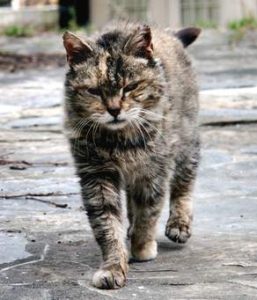 In a perfect world, all cats would have a loving home, they would be spayed or neutered and they would be kept indoors. Stray cat problems arise because unaltered pet cats are permitted to roam freely outdoors and they either become feral (wild) over time and/or they produce feral offspring.
In a perfect world, all cats would have a loving home, they would be spayed or neutered and they would be kept indoors. Stray cat problems arise because unaltered pet cats are permitted to roam freely outdoors and they either become feral (wild) over time and/or they produce feral offspring.
The only time a cat should ever be allowed outdoors is when it is too feral to keep indoors and then only if it is spayed or neutered so it doesn’t contribute to feral cat overpopulation. However, the responsibility for making sure feral cats are spayed or neutered often unfairly falls to a compassionate person who voluntarily steps up to feed them.
Truth be known, these caregivers and their feral cats deserve our respect and our support; they provide an important service to our developing communities. They help alleviate pressure on our overcrowded shelters; they help keep rodents in check without the use of pest control chemicals that are toxic to the environment and dangerous to pets, wildlife and children; and they help reduce rodent related public health risks, such as the plague, the fatal Leptospirosis, Hantavirus Pulmonary Syndrome, Murine Typhus, Rat Bite Fever, Salmonella enterica serovar Typhimurium, and Eosinophilic Meningitis.
Feral cats have taken the place of the diminishing wild animal populations in preventing an overpopulation of rodents. This is why more and more U.S. communities are joining Denmark, England, Israel and other countries in relying on feral cats to serve as a “green” (environmentally friendly) rat abatement program.
The reason feral cats are so effective is because rodents flee neighborhoods where these cats make their presence known. They actually give off an odor through their paws as they prowl about and once rodents get a whiff of feline, they quickly vacate the premises.
Less grisly than glue traps — and much more effective – feral cats go about their “work” naturally. They prowl, they eat and they sit in the sun; although they prefer to spend much of their time hiding from view.
And the oft heard complaint that feral cats are a public nuisance can be humanely remedied through a formalized feral cat program – because, contrary to conventional wisdom, you can herd cats. Feral cats tend to follow the food bowl. Unobtrusive feeding stations established in out of the way locations ensure feral cat nuisance complaints are greatly reduced if not eliminated altogether.
I encourage municipalities to support feral cat caregivers through a program called Operation FELIX (Feral Education and Love Instead of X-termination). Through Operation FELIX, feral cats are spayed or neutered, vaccinated, micro-chipped and ear-tipped (under anesthesia while the cats are being altered, veterinarians notch an ear tip, the widely recognized sign that a feral cat is altered).
To truly be effective, local municipalities should allocate funding to support Operation FELIX in their respective jurisdictions, as they are typically the recipients of feral cat complaints. Until that happens, YHS depends on donations and grants to help support our community’s volunteer feral cat care givers as they voluntarily provide this valuable community service.
If you want to help support this innovative, non-lethal feral cat program please make a donation to your local shelter and specify “FELIX” on your check.
For more information on Operation FELIX or how to solve feral cat problems in your neighborhood contact me.
If you have a rodent problem in your home or place of business, consider adopting a Working Cat as a humane solution.
In the cold weather, be sure to tap the hood of your car before starting it. Cats often look for warmth under the hood and this simple practice could save a life.
